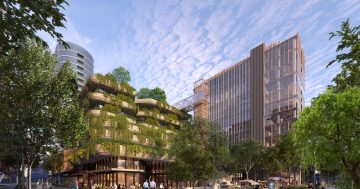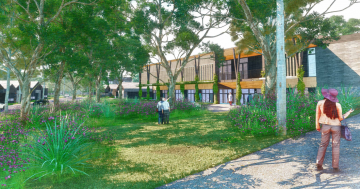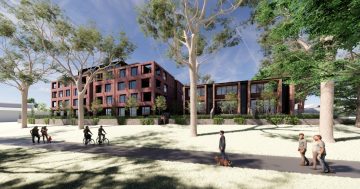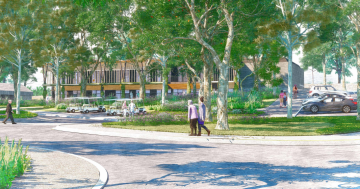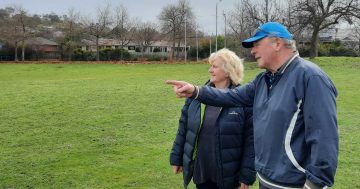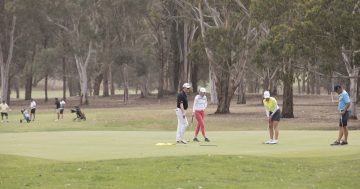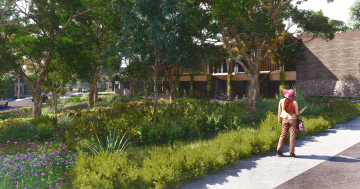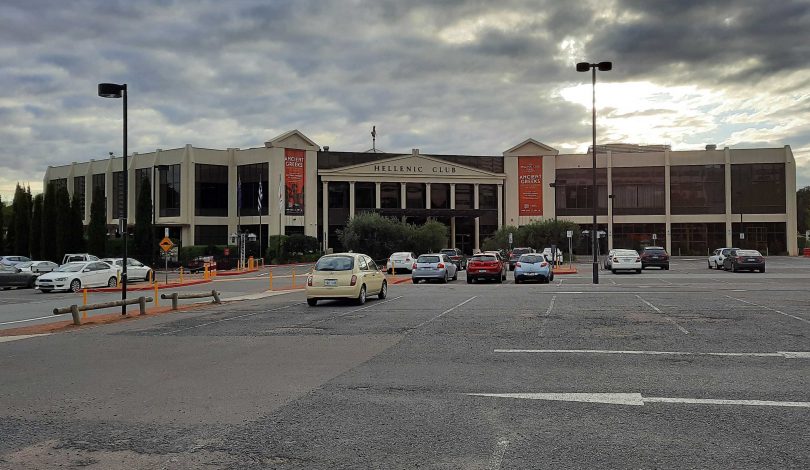
There are big plans for the Woden Hellenic Club site. Photo: Ian Bushnell.
It’s make or break time for ACT clubs as the pokies jackpot dries up under government policies to reduce gambling harm and amid growing community antipathy towards the ‘one-armed bandits’.
The ACT Government continues to provide financial incentives for clubs to divest their gaming machines, the latest being a $1.74 million surrender program, but replacing gambling revenue with a sustainable, long-term income stream has been exercising the minds of CEOs.
When they look out their office windows, the solution is probably staring them in the face – the land on which their clubs sit. And some say the government can do more to help clubs use that asset to secure their futures.
This week the Woden Hellenic Club unveiled a new master plan for its site, an ambitious mixed-use development program that combines new recreation attractions, including a 2,000 seat theatre and dining area for its members and the community, and commercial ventures, including an A-grade office block and a high-end hotel.
All of them will guarantee reliable revenue streams over the long term.
Other clubs looking at alternative business plans include Ainslie Football and Social Club, which has released plans for residential development on its site, the Burns Club in Kambah, the Italo Australian Club in Forrest and the Canberra Services Club.
Proposals face a number of hurdles, not just in the planning system but from concerns in the community about the impact of developments on the environment, neighbours and local amenity.
Clubs also need to remain faithful to their original purpose and role.
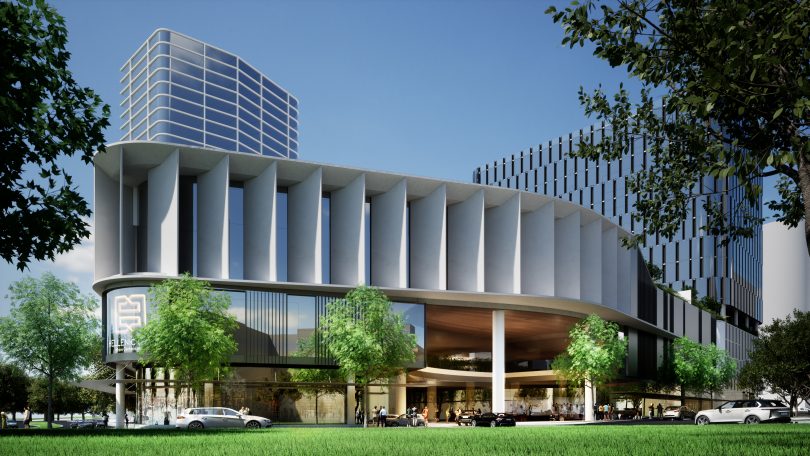
A concept illustration of what the Woden Hellenic Club could look like. Image: Woden Hellenic Club
Purdon Planning is one of many consultancies in Canberra guiding clubs into this new future and assisting them with whatever style of development club leaders decide on.
Managing director Richard Nash says clubs that don’t adapt and move away from gaming revenue are likely to struggle.
“Clubs are in a vulnerable position because poker machines will never again be viewed as favourably as they once were,” he says. “This means poker machine revenue is never likely to grow. In fact, it is only ever likely to shrink.
“The model on which they were built is out of favour, and is unlikely to return to favour.”
Mr Nash says clubs need to work with the assets they have to remain viable and continue serving their original mission.
“And for many clubs, the only physical asset they have that isn’t a pokie or a big older building is land,” he said.
That being said, it won’t be enough for clubs to just argue their survival depends on building a block of flats. They will have to convince both government and the community that there will be a social dividend.
Mr Nash says that with the right incentives and planning controls, clubs could use their land to develop important community assets such as affordable rental and aged care without any government outlay.
“I think the opportunity is there for the government to incentivise clubs to redevelop and meet community needs. With the right incentives and modest remissions, clubs could provide thousands of new affordable rentals and retirement dwellings across the city in good locations,” he said.
“It could be done in a way that helps clubs by reducing reliance on gaming revenue while allowing them to develop non-gaming assets that generate sustainable revenue and also meet a community need.”
Mr Nash says some of the larger clubs are already doing this, but there are many more examples of club sites that could be redeveloped to provide something for the community.
A key issue for many clubs is their concessional leases, obtained at a discount when the club was established.

The Ainslie Football and Social Club master plan shows its development plans. Image: SPACELAB
Deconcessionalisation, or changing to a normal or commercial lease, is the first step towards being able to do more with club land, but Mr Nash says that it can be an expensive and uncertain process, and the government has rejected several applications in the last 12 months.
The process attempts to recoup value for land that was originally sold cheaply to a club for community purposes.
“Deconcessionalising club sites appears to be very difficult at the moment,” Mr Nash says. “Deconcessionalisation is not that well understood by the community. A deconcessionalised lease gives a club no development rights. It merely enables clubs to then consider what other development rights they could apply for. And pay a lease variation charge.
“And to be clear, if a club site is deconcessionalised, clubs then have to pay a lease variation charge for any non-club uses that they add to their leases.”
Clubs also aren’t like other businesses that can use their assets any way they like.
Mr Nash says clubs, for instance, have to go through a complex approval process to move gaming machines from one club site to another, unlike any other business that can just load and truck and move its physical assets.
The other factor influencing development generally is the demise of the surface car park in the ACT as demand for land soars and it becomes more valuable.
“The sun is setting on surface car parks as the ACT is running out of developable land,” Mr Nash says.
“The government knows this and has been leading the way in better utilising surface car park sites.”
With both Labor and the Greens committed to increasing infill development as government policy, he says that it makes no sense to hang on to well-placed sites in a growing city for car parks.
Mr Nash believes the opportunities are there for clubs to be even more of a force for good in their communities, without the negative effects of gaming machines.
“Clubs pump hundreds of thousands of dollars into community sports each year,” he says.
“There is no clear alternative to fill that gap if clubs lose the ability to do that. It’s entirely reasonable that clubs work to find other sources of revenue to continue with their mission.”












